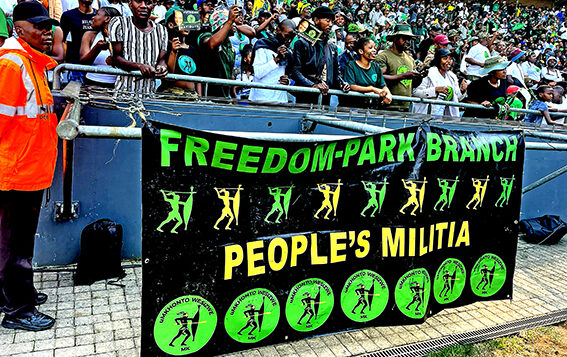South Africa’s general elections in May 2024 redrew the political map in dramatic fashion. After three decades of dominance, the ANC was humbled, losing its parliamentary majority for the first time.
But while much has been made of the ANC’s decline and the tenuous architecture of the government of national unity (GNU), it was the surging rise of the MK Party that delivered the true electoral thunderclap.
With 14.6% of the national vote and a dominant 45% in the KwaZulu-Natal provincial legislature, the MK Party’s debut was nothing short of astonishing – a political debutante striding boldly into a space long monopolised by ageing titans.
Its success, we were told, was a signal of yearning: millions disillusioned by ANC complacency, desperate for a new voice that promised redress, dignity and change.
But how quickly hope curdles into farce. Barely a year since that heady electoral breakthrough, the MKP stands less as a symbol of democratic renewal than a cautionary tale of political immaturity, vanity and chaos.
Rather than pressing the GNU with probing opposition and moral authority, the party has degenerated into a punch-drunk sideshow – flailing about in a spectacle of factional brawls and revolving-door leadership, all the while abandoning the very people who handed it a mandate.
Indeed, if politics is theatre, then the MK Party has opted for pantomime – loud, disjointed, and painfully unserious. The rate at which its leadership changes positions would make a Formula One pit crew blush.
What should be an agile, focused political force holding the GNU to account has become a party chasing its own tail, distracted by egos, power squabbles and the seductive narcotic of media sensationalism.
And what of KwaZulu-Natal, the very province that crowned it a victor? The province has become the crucible of their dysfunction – less a stronghold than a stage for their tragicomic infighting.
Let us be brutally honest: this is not the conduct of a party ready to govern. This is the behaviour of a political vanity project drunk on its own hype and utterly disconnected from the gravity of the hour.
The consequences of this disarray are neither abstract nor benign. Internal strife is not just a party problem; it is a national one. South Africa’s fragile democracy cannot afford for its most promising opposition force to implode in real time.
When a party is consumed by internal conflict, it forfeits its capacity to confront the real crises of governance – unemployment, inequality, failing infrastructure, and spiralling public disillusionment.
It retreats from the battlefield of policy into the bunker of petty vendettas. Worse still, a party riven by factionalism marginalises the very people it claims it seeks to uplift.
With every dramatic leadership purge and factional fallout, the voices of the
ordinary South Africans who placed their trust in the MK Party are drowned out.
Representation collapses. Accountability vanishes. And the momentum for transformative change – a momentum born out of genuine public despair – evaporates.
This is more than a missed opportunity. It is a betrayal. The MK Party was not merely a beneficiary of ANC fatigue. It was a vessel for the aspirations of the forgotten: the rural and urban youth disenchanted with empty promises, the unemployed who had waited decades for dignity, and the millions who saw in the MK banner a return to principled resistance.
That trust is being squandered at an alarming rate.
And make no mistake, the electorate is watching. South Africans are not naïve.
They have endured too much political theatre, too many messiahs-turned-mercenaries, to be dazzled for long. If the MK Party continues on its current path, it will find itself not only irrelevant, but reviled – reduced to a cautionary footnote in the democratic archive.
The lesson here is stark: politics is not performance. It is a responsibility.
It is the sober, relentless labour of serving a nation on the brink. MKP still has time to course-correct – to silence the noise, abandon the egos and earn the legitimacy the party once seemed destined for.
But the clock is ticking.
And history has little patience for squandered revolutions.
As the country teeters on the precipice of a new political era, the MK Party must decide whether it wishes to be an agent of transformation or yet another failed actor on South Africa’s ever-turning stage of broken promises.
• Mdakane is a senior reporter



